You’ll need roughly $4,930 a month as a practical single-renter budget in Boise to cover rent, utilities, groceries and modest extras. Median one‑bedroom rent is about $1,109–$1,148, two‑beds average $1,278–$1,356, and groceries for one run about $333–$413 monthly. Utilities and internet usually stay under $300, while transportation ranges $411–$1,100. Factor in move‑in deposits and a $38 monthly transit pass. Keep going to see detailed breakdowns and salary targets.
Boise Cost of Living Overview

While Boise’s overall cost of living sits slightly above the national average (index ~106.1), you’ll find a mix of higher and lower expenses that affect budgets differently.
While Boise’s cost of living is modestly above average (index ~106.1), some expenses are higher and others lower.
Boise’s cost of living shows renter costs about 3.5% above the U.S. norm; median one‑bedroom rent runs roughly $1,109–$1,148, and two‑bedrooms average $1,278–$1,356, so splitting a two‑bedroom often lowers your per‑person housing outlay.
Expect typical monthly expenses for a single renter near $4,930 and homeowner household estimates around $8,537.
Groceries and goods/services trend modestly higher (groceries ≈ +3.9%; goods/services ≈ +7%), but utilities are a clear savings — about 23% below the national average — reducing your baseline bills.
Transportation costs are higher: gas sits near $3.50–$3.61/gal, vehicle costs are elevated, and limited evening public transit makes car reliance likely.
Building a home in the area could significantly impact your monthly budget depending on local market conditions and construction costs.
Use these figures to create a realistic monthly budget that weights housing, groceries, utilities, and transportation costs.
Housing Prices and Rental Market
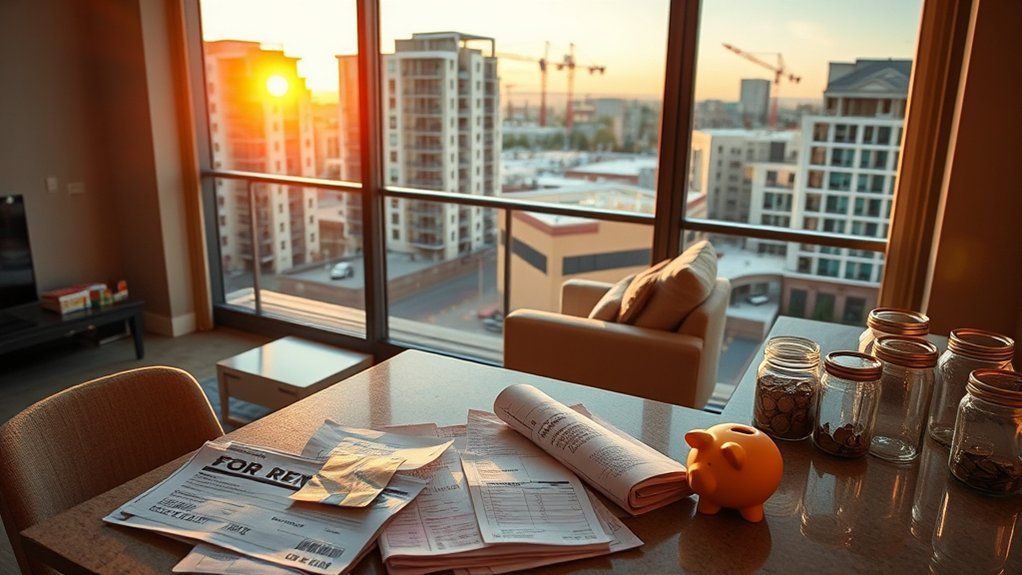
Having looked at overall living costs, let’s focus on housing—the single biggest line item for most budgets.
You’ll find rent in Boise varies: a one-bedroom apartment in Boise runs about $1,109–$1,148 per month; two-bedrooms average $1,278–$1,356, roughly $208 higher. Splitting a two-bedroom can save you about $678/month versus renting a one-bedroom alone.
The citywide median home sits near $514,000–$599,900 depending on source, and some datasets show year-over-year increases measured in the hundreds of thousands. Average rent across Boise lands around $1,462–$1,696 monthly, about 3.5% above national measures.
When budgeting, include upfront costs: application fees, security deposits and possible pet deposits. Use apartment-listing services to compare units, neighborhoods and amenities, and factor roommate arrangements or buying versus renting into your decision. Prioritize what you’ll trade—space, commute, or cost—to match housing to your monthly budget.
Monthly Utilities and Internet Costs

For a renter in Boise, monthly utilities and internet usually add up to a manageable portion of your budget: basic utilities (electricity, heating, cooling, water, garbage) for a ~915 sq ft apartment run about $139–$143, electricity averages roughly $108.73/month (about 11.36¢/kWh), natural gas about $53/month, and internet plans for 60 Mbps+ commonly cost $50–$80 (average ~$75.47); add a cell plan (standalone averages near $48, though it can be as high as $179 if you’re financing a phone or on a premium family plan) and your total energy+internet+phone typically stays under $300/month, about 23% below national utility levels. Additionally, schools can benefit from budget constraints when planning for repairs and maintenance, further aiding in overall financial management.
You can expect average monthly utilities and energy costs to be predictable: electricity is the largest single line item, followed by natural gas and municipal services. Internet service at typical speeds is competitively priced, and choosing a basic cell phone plan keeps combined bills low. Track usage, compare ISPs, and avoid unnecessary device financing to keep costs down.
Grocery Prices and Dining Out

You’ll see grocery spending in Boise roughly matches national averages, with a single person paying about $4,957 yearly (~$413/month) and a family of four about $14,569 (~$1,214/month).
Typical item prices — bread ~$3.97–$4.12, eggs ~$3.63–$4.14/dozen, milk ~$4.69–$4.75/gallon, ground beef ~$7.03–$7.40/lb, and steak ~$15.52 — help you build an accurate grocery budget. Additionally, average cost range for food items can vary based on seasonality and local markets, so it’s wise to keep an eye on current prices.
Eating out ranges from about $19.50 for an inexpensive meal to ~$70 for a mid-range dinner for two, so plan for occasional restaurant visits when setting your monthly food spend.
Grocery Cost Breakdown
Crunch your food budget by buying staples and cooking at home: groceries for a single resident in Boise average about $413/month (roughly $4,957/year), with common prices like a loaf of bread ~$3.97, a dozen eggs $3.63–$4.14, a gallon of milk ~$4.69, ground beef $7.03–$7.40/lb, and boneless chicken about $4.83/lb, so protein quickly becomes a major line item.
You can control food costs by tracking prices per item and planning a realistic monthly grocery budget. Compare store brands, buy seasonal produce, and batch-cook to lower per-meal costs. Dining out raises your average spend quickly, so reserve it for treats.
Visualize cost trade-offs:
- Pantry staples stacked in bulk containers.
- A week of meals prepped in reusable tubs.
- Receipts showing itemized prices per item.
Eating Out Prices
After planning weekly menus and stocking your pantry, consider how often you’ll eat out and how that choice affects your monthly food budget. You’ll find groceries average $413/month, but eating out prices vary: an inexpensive restaurant meal is about $19.50, fast-food combos run $14–$22, and a three-course dinner for two is roughly $70 (no alcohol). Coffee prices push totals higher—specialty to-go lattes near $6.99. Downtown pub dinners average about $59 for two; concessions and snacks are slightly above national averages. To control costs, balance home cooking with selective dining out and watch local supermarket specials at Albertsons, WinCo, and Walmart.
| Item | Typical Price |
|---|---|
| Inexpensive restaurant meal | $19.50 |
| Fast-food combo | $14–$22 |
| Three-course dinner (for 2) | $70 |
| Specialty coffee | $6–$7 |
Budgeting for Meals
Frequently, the biggest lever on your monthly food bill is the choice between cooking at home and eating out, so plan around the $413/month grocery baseline for a single (about $4,957/year) versus roughly $1,214/month for a family of four (about $14,569/year).
You’ll use that groceries per month figure if you mostly stick to home‑prepared meals; frequent dining raises your monthly food budget quickly.
Note common price of staples: milk ~$4.69/gal, eggs ~$3.63–4.14/dozen, bread ~$3.97–4.22, ground beef ~$7.03–7.40/lb.
Shop Albertsons, WinCo, Walmart, use weekly deals or bulk buys to cut costs.
Weigh eat out vs cook by tracking per‑meal costs and aiming to shift a few restaurant meals to cooking at home.
- Visualize a cart of sale items.
- Picture bulk rice, beans, frozen veggies.
- Imagine a homemade dinner vs a $19.50 casual meal.
Transportation Options and Commuting Costs
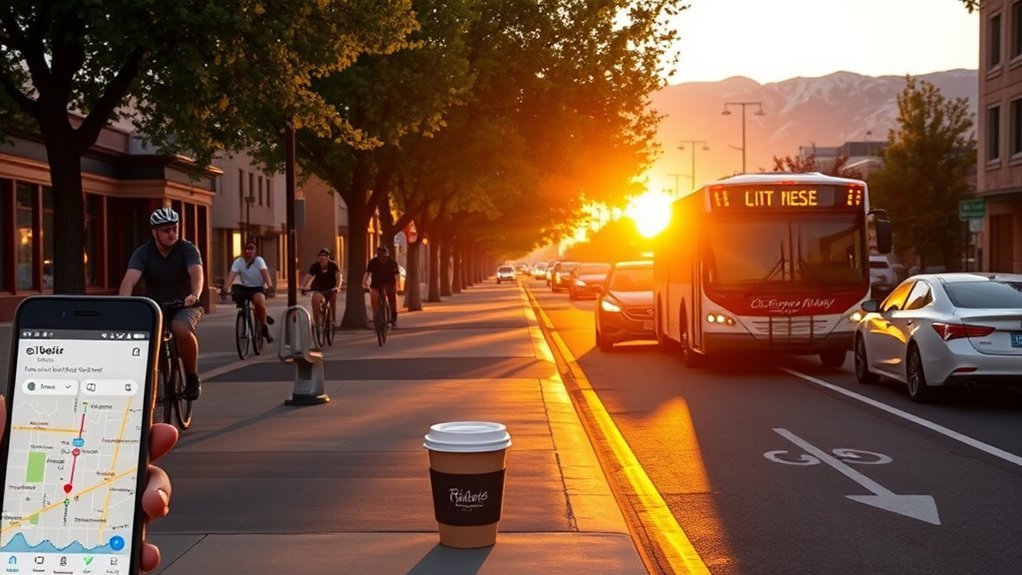
When budgeting for transportation in Boise, expect wide variability: annual costs for one person range from about $4,938 if you rely on transit to roughly $13,205 if you include car ownership, insurance, and commuting.
Valley Regional Transit has about 25 routes with $1.50 one-way fares and $38–$42 monthly passes but service is roughly half-hourly and often ends around 7:00 PM, so schedule limits may force you to drive.
Factor in gas (~$3.20–$3.61/gal), higher-than-average maintenance (tire rotation ≈ $70), typical regional distances (Nampa ~29 min, Twin Falls ~2 hrs, SLC ~5 hrs), and options like biking or carpooling to lower costs. Additionally, it’s important to consider the cost factors for replacement of any vehicle components, such as air conditioning parts, which can impact your overall budget.
Public Transit Limitations
Usually, you’ll find Boise’s public transit workably cheap but limited: Valley Regional Transit runs about 25 bus routes with one-way fares near $1.50 and monthly passes around $38–$42, yet many stops only run every 30 minutes and regular service largely ends around 7:00 PM, which cuts evening options and makes transit impractical for many commutes.
You’ll save on bus fares, but limited service raises real commute costs when trips require long waits, transfers or alternate transport.
Expect trade-offs between price and flexibility; many residents choose cars for reliability.
Picture typical impacts on daily life:
- A 30-minute wait for a single connection during rush hour.
- Missing evening events because service ends by 7:00 PM.
- Multiple transfers adding time and uncertainty to errands.
Driving Costs & Distances
Because driving is the most reliable way to get around Boise, you should budget carefully for fuel, maintenance and longer regional trips: expect monthly transportation costs roughly between $411 and $1,100 depending on whether you own a car, with gasoline in the area running about $3.20–$3.61 per gallon (above the national average of ~$3.09) and vehicle service items (like tires) costing slightly more than elsewhere; factor in that regional drives are substantial too — Nampa is about 20 miles (≈29 minutes), Twin Falls about 128 miles (≈2 hours) and Salt Lake City roughly 339 miles (~5 hours) — all of which add mileage, wear and time to your budget and commute calculations.
You’ll compare gas per gallon, vehicle maintenance and public transit fares (one-way ~$1.50, monthly $38–$42) when weighing costs. Use commuting distances to estimate fuel consumption, depreciation and occasional longer-trip expenses.
Bike & Alternative Options
If you’re looking to cut the high costs and wear that come with driving, Boise’s bike lanes and Valley Regional Transit give you real alternatives. You’ll find the city bike-friendly for short commutes, especially downtown and nearby neighborhoods, where cycling often beats driving on time and cost.
Valley Regional Transit runs ~25 routes; one-way fares are about $1.50 and monthly passes $38–$42, though service tapers off after ~7:00 PM. With local gas at ~$3.20–$3.60/gal, shifting to bike+public transit lowers commuting costs and delivers clear gas savings and maintenance reductions.
- Picture a 10–20 minute bike into downtown.
- Imagine a park-and-ride plus a $38 monthly pass.
- Visualize replacing weekly fill-ups with routine rides.
Healthcare, Insurance, and Out-of-Pocket Expenses
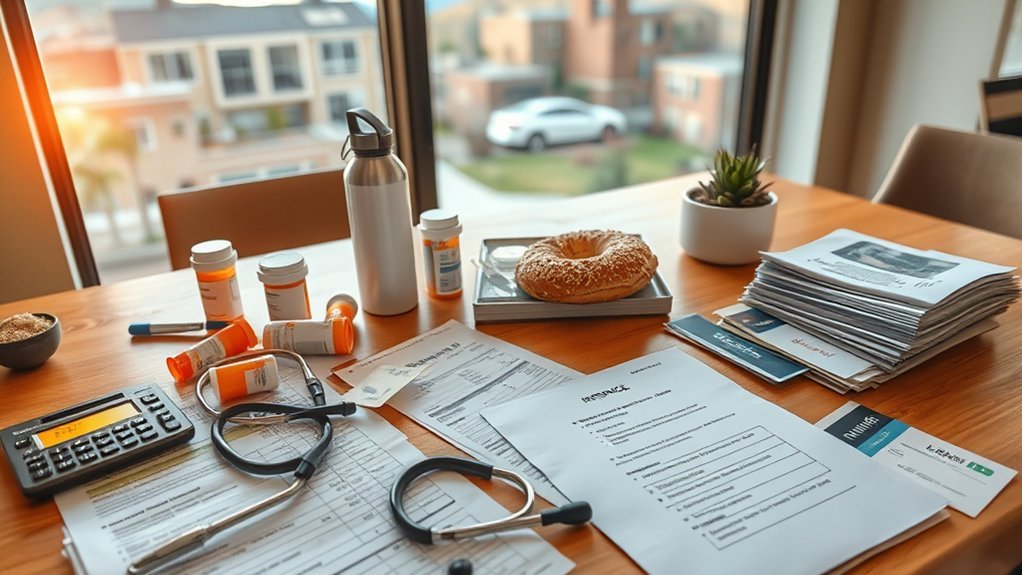
When you budget for healthcare in Boise, plan on roughly $2,563 a year for a single adult (about $214/month) and around $9,322 for a family of four (≈ $777/month).
Budget about $2,563/year (~$214/month) for one, or roughly $9,322/year (~$777/month) for a family of four.
You’ll find medical costs include typical out-of-pocket expenses like a doctor visit copay near $170 and dentist visits $102–$117; optometrist exams run about $145–$149.
Health insurance premiums vary: mid‑level individual plans commonly cost $400–$600/month, while family plans often fall between $1,200–$1,800/month.
If you’re under 26, you can often stay on a parent’s plan, but confirm network coverage after moving to Boise or enroll via the federal marketplace.
Prescription drug prices are modest—common prescriptions average $19–$21, and OTC items like pain relievers cost about $11.
Routine preventive care aligns with national averages. Additionally, understanding out-of-pocket expenses can help you better prepare for unexpected medical costs.
Use these figures to compare employer offers, calculate monthly premiums plus expected out-of-pocket costs, and set an emergency health buffer in your budget.
Entertainment, Fitness, and Recreation Spending

After accounting for healthcare costs, you’ll want to budget for leisure and fitness, which can vary widely but generally stay affordable in Boise. Gym memberships typically run $30–$70 monthly, though many apartments include free on-site fitness centers that lower your cost. Outdoor activities like hiking, mountain biking, and climbing are largely free; factor extra for guided trips or equipment rentals. Movie tickets average $11.90–$12.50, so two tickets will cost roughly $24–$27. Casual drinks and coffee are moderate—expect about $11 for a downtown cocktail and $6–$7 for a cappuccino. Local museums charge modest fees (around $6–$15), keeping cultural entertainment costs reasonable. Additionally, investing in long-term savings through a home gym can further enhance your fitness routine while reducing monthly expenses.
- Picture a $40 gym membership plus free community trails for weekend hikes.
- Imagine two movie tickets and a couple of $7 coffees for a relaxed date night.
- Envision occasional guided climbs or museum visits adding $20–$50 monthly.
Use these figures to set a realistic monthly recreation line item.
Typical Monthly Budgets by Household Type
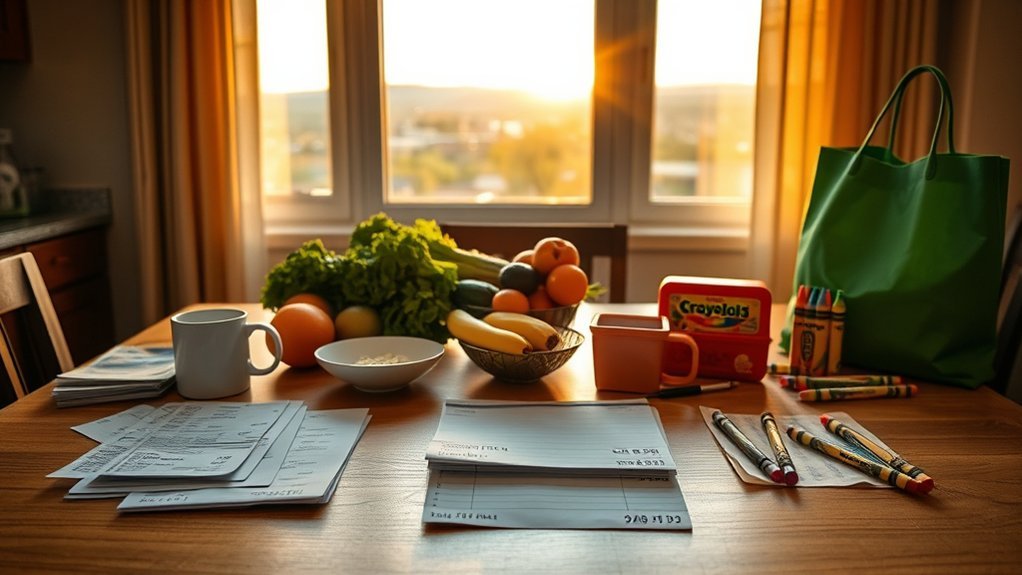
If you’re a single renter in Boise, plan for roughly $3,215–$4,930 per month with a common working estimate near $4,930 to cover housing, groceries, transport, healthcare and services.
For housing expect one‑bedroom rent around $1,109–$1,795 (many sources cite ~$1,109–$1,148) and renter housing costs often near $2,208/month.
If you’re budgeting for a family of four, count on roughly $5,546 up to $7,787–$8,943 per month, with groceries alone about $1,214/month. Additionally, it’s important to consider operational expenses such as utilities and maintenance when calculating your overall budget.
Single Adult Budget
Plan on spending roughly $3,200–$4,900 per month as a single adult in Boise, depending on whether you use a conservative budget or a renter-focused estimate. You’ll see median rent quoted from about $1,109–$1,148 (some sources show $1,695–$1,795), so under the 30% rule you’d need roughly $3,327/month to comfortably afford a one‑bedroom.
Typical groceries run about $333–$413/month.
Utilities, internet and phone add roughly $262, and gym or misc costs another $40–$75. Transportation varies widely; plan for higher costs if you drive.
- A modest apartment with basic utilities and internet.
- Weekly grocery shopping and occasional takeout.
- Gas, insurance and occasional rideshares.
This gives a practical snapshot of monthly costs for a single adult.
Family of Four
Moving from single-adult costs to family budgeting, expect expenses to rise substantially: a typical family of four in Boise spends about $5,546 per month on basic needs, roughly 1.6% above the national average.
You’ll see housing costs drive most of that total — homeowner scenarios can push budgets much higher (examples near $8,537/month) while renter households may average around $4,930/month depending on unit and neighborhood.
Groceries average about $1,214/month if you cook at home; eating out will increase that line.
Plan for transportation near $1,846/month for two working parents and medical costs about $777/month.
Utilities tend to be below national averages, so prioritize housing and transportation when adjusting your family-of-four monthly expenses.
Moving, Rental Fees, and One-Time Costs

When you relocate to Boise, expect one-time moving costs that typically run about $1,000–$4,000 for local moves and $4,000–$12,000 for long-distance moves, with long hauls often adding lodging, extra fuel, and possible storage fees.
Moving to Boise means budgeting beyond trucks: rental upfront fees commonly include application fees and a security deposit (often one month’s rent) plus any pet deposits.
You should also plan for utility deposits and internet installation costs; monthly internet runs about $50–$80, but installation or activation is a one-time hit.
Furnishing, basic supplies, and incidental purchases add up quickly.
- A moving truck and fuel for a multi-day drive, plus hotel stays.
- First-month rent, security deposit, application fee, and pet deposits.
- Utility deposits, internet installation, basic furniture and home setup.
Additionally, consider the potential costs of maintaining air conditioning systems as they can add to your overall living expenses.
Track each line item, get receipts, and compare local movers vs. DIY to control one-time moving costs.
What Salary You Need to Live Comfortably in Boise
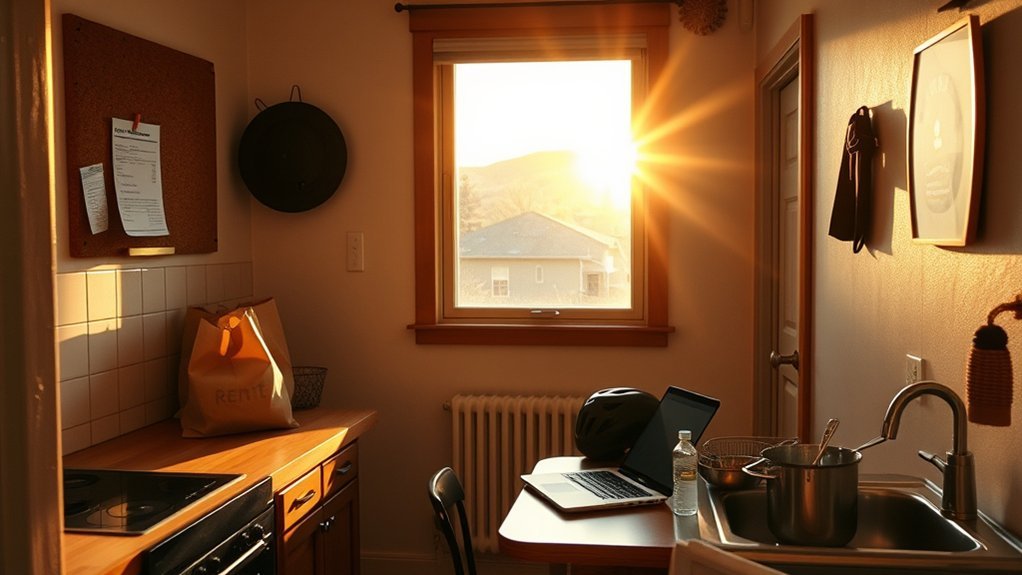
After you’ve tallied one‑time moving expenses and set up housing, the next question is how much you need to earn to live comfortably in Boise.
Using clear benchmarks helps: the 30% rule implies a single adult should make about $3,327/month ($40,000/year) to afford the median one‑bedroom rent near $1,109–$1,148.
A practical monthly budget for a comfortable lifestyle points toward roughly $59,160/year before taxes to cover housing, utilities, food, transportation, and modest discretionary spending.
Compare that to the living wage Boise estimate of $21.65/hour (about $45,000/year full‑time) for basic needs without subsidies.
If you share a two‑bedroom, you can cut housing costs by about $678/month, lowering the salary you need to live comfortably.
Remember to factor Idaho’s top income tax (6.925%) and ~6% local sales tax when converting gross salary into take‑home pay so your monthly budget stays realistic. Additionally, understanding the lawyer’s fee structure can help you manage potential legal expenses if you face traffic violations that may arise during your time in the city.
Frequently Asked Questions
How Much Money Do You Need to Live Comfortably in Boise, Idaho?
You’ll need about $59,160/year (~$4,930/month) to live comfortably; that covers rent, groceries, transportation, healthcare, internet. Remote work boosts flexibility, outdoor recreation access, food scene, neighborhood safety, and nightlife options affect your budget.
What Is the Average Cost of Living per Month in Idaho?
You’ll need roughly $3,200–$5,500 monthly in Idaho, depending on housing trends, transportation costs, food prices, utility averages, and healthcare spending; you’ll plan, track expenses, and adjust for your location and lifestyle.
Is Rent Expensive in Boise, Idaho?
Boise’s rent isn’t extreme; you’ll find midrange prices versus West Coast cities, with renter demographics shifting, short term rentals affecting availability, suburban comparisons showing savings, tenant rights matter, and utility variability can raise your total cost.
Is Boise, Idaho an Affordable Place to Live?
Yes — Boise’s balance of higher housing costs and modest utilities means you’ll afford it only if your income fits; consider neighborhood safety, commute times, local taxes, healthcare access, and community events before deciding.
Conclusion
Think of settling in Boise like planting a backyard apple tree: with an average rent of about $1,400/month and utilities near $180, you’ll budget, water, and wait to reap comfort. If you set a monthly target of roughly $3,200 for a single renter (rent, groceries, transit, entertainment), you’ll cover essentials and an occasional night out. Plan upfront moving fees and build a three-month reserve so your tree can weather slow seasons.


